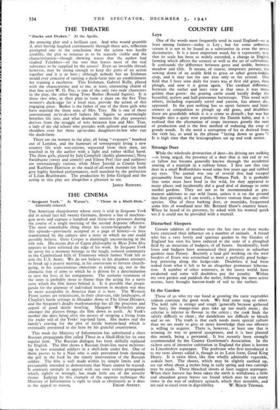COUNTRY LIFE
Leys
One of the words most frequently used in rural England—or at least among farmers—today is Ley ; but for some unknown reason it is not to be found as a substantive in even the newer dictionaries. It is a most important word, for it represents now that its scale has been so widely extended, a change in English farming which affects the scenery as well as the art of cultivation. It confounds the difference between grass and arable, between meadow and tilth. It means, of course, temporary pasture, the sowing down of an arable field to grass or other green-fodder crop, and it may last for one year only or for several. One field that I have seen daily for years was at first old grass, then plough, and now it is green again. The cardinal difference between the earlier and later view is that once it was more golden than green: the grazing cattle could hardly dodge the beautiful, useless and half-poisonous buttercups. This weed with others, including especially sorrel and yarrow, has almost dis- appeared. In the past nothing has so upset farmers and land- owners as compulsion to plough up old grass and doubtless there are grassfields which it is a crime to disturb ; but war has brought into a quite new popularity the Danish habit, and it is realised that the alternation of crops increases greatly the sum of production and is the best method of reducing the crop of greedy weeds. Is the word a corruption of lea or derived from the verb lay, as used in the phrase "laying down to grass "? It is high time that the lexicographers sat up and took notice.






















 Previous page
Previous page